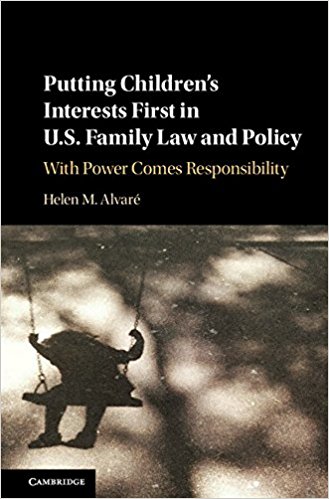Justice Kennedy's retirement marks the end of an era, but are we prepared for what comes next?
Let’s Talk about Sex
In Putting Children’s Interests First in U.S. Family Law and Policy, Helen Alvaré argues that today’s culture of emphasizing adult sexual expression is exhausted and corrupt. It has created a culture of short-term, non-relational thinking in which men are disengaged from relations, women increasingly dissatisfied by them, and children more unwell.
America’s old sexual regime discouraged adult sexual expression through proscribing contraception, criminalizing fornication and sodomy, and discriminating against what were then called bastard children. This regime aimed to connect sex, procreation, and marriage in law and opinion.
Alvaré, a law professor at the Antonin Scalia Law School of George Mason University, admires the aims of this old regime. This old regime is now dismantled. Griswold v. Connecticut (1965) and Eisenstadt v. Baird (1972) constitutionalized access to contraception under the right to privacy. Laws enforcing marital sex and fidelity are repealed or lie in desuetude. Discrimination against illegitimate children eroded just as laws denying public benefits to those living together outside of marriage were declared unconstitutional. American law and policy are, the author concedes on the book’s first page, devoid of legal means of encouraging childbearing within marriage. Good riddance, she seems to say, to the means used under this old regime.
It was replaced by a regime that valorizes “adult sexual expression.” By this phrase Alvaré means connecting the goods of dignity, identity, and equality to the paramount importance of sexual choice or sexual desire without much thought of cultivating responsible choice. Adult sexual interests could, under the new regime, no longer be channeled toward marital, procreative sex. This “government-endorsed sexual expressionism” means an official stance of hostility to the connection between sex, procreation, and marriage.
While earlier Supreme Court decisions facilitated sexual self-expression, Casey v. Planned Parenthood (1992), affirming the right to abortion, “first took constitutional cognizance of ‘intimate choices’ and ‘unplanned activities’ free of children, on the grounds that sex is identity- and personhood-shaping.” Lawrence v. Texas (2003), invalidating anti-sodomy laws, seems to articulate a “constitutional right to sexual expression unlinked to marriage and children.” These cases culminate, for now, in Obergefell v. Hodges (2015), which, ending state support for man-woman marriage, held that “a state’s interest in the birth of a child, and children’s interests in remaining linked to their biological mother and father, cannot ground any state’s marriage recognition laws.”
Beyond the judiciary, this idea that sex acts are central to identity-formation has led to the spread of contraception programs, the promotion of transgender ideologies in schools and public accommodations, and all manner of abortion funding. It informs agency fact sheets, which emphasize safe sex and integrating sex into one’s life plan but are non-judgmental on what that life plan would be and what form that sex would take (so long as its consensual).
Taken together, these policies reconstruct the sex act as a “subjective, meaning-making enterprise.” The body is a “matter for personal interpretation,” a resource to be manipulated according to the autonomous choices of individuals.
Studies show, as Alvaré relates, that children suffer when sex is divorced from marriage. Being raised by biological parents is the best circumstance for a child, and marriage is the means to connect biological parents to children. The new regime valorizing sexual expression precludes government and culture from working at the “front door” of a child’s life and promoting marriage as a means to a child’s best being.
All government can do under this new regime is treat the wounded children or help prevent their birth. The government treats the wounded at the “back door,” as Alvaré puts it, by supporting poor children of unmarried parents with governmental programs. Back-door programs do little to improve childhood experiences or outcomes, studies show. What is needed is marriage, but under the new regime, governments and government contractors cannot act on that fact.
The promotion of contraception prevents the birth of children who are likely to be troublesome. The thinking goes like this: The use of contraception means that every child will be a wanted child. Wanted children are better taken care of. Parents with contraception can integrate sex and procreation as they see fit into their broader life plan, whatever that is. Contraception, on this vision, promotes rationality and planning, so it is crucial for the federal government to educate in the use of contraception and then to support lifestyle choices with available child care at the “back door” if a woman chooses to have a child.
Alvaré neatly catalogues the problems with valorizing of sexual expression. Concerning the “back door” approach to aid, studies show that it is too little, too late for children. Concerning contraception, she emphasizes the adverse health effects and the ways in which a hook-up culture compromises the human ability to form permanent relationships and, more importantly, the ways in which it compromises a culture welcoming to new life. Moreover, the contraception argument is, studies show, flawed in that the widespread use of contraception, while it may facilitate sexual expression, has not led to a decline in the number of unintended pregnancies nor has it coincided with an increase in childhood well-being. Something other than contraception (namely, marriage) is needed to achieve child well-being.
The culture of sexual self-expression risks harming women, Alvaré argues. Inclined by nature to value personal relations more than sexual expression and adventure, women are less likely to endorse sex without commitment or marriage. Women are less likely to endorse and welcome the attendant culture of casual sex, where they are pressured to participate or be ignored. Perhaps the prevalence of this new sexual regime contributes to the paradox of declining female happiness.
Generally, the emphasis on sex and sexual expression makes it more difficult for people to forge enduring, sacrificial bonds with one another and compromises the capacity to be responsible toward spouses, children, and other extended family. Cheap sex leads to less love. It is the solvent for connections between sex, procreation, and children.
What to do given the dismantling of the old regime and the pervasive influence of the new? It is a daunting task. Alvaré would not try to encourage more responsible behavior by removing the “back door” government aid to families. She would leave the “back door” in place but institute two reforms. First, sex education in schools should not speak only of sexual expression and safe sex, but also of connecting sex to long-term purposes such as marriage and child-raising. Second, agency fact sheets should be rewritten to emphasize the sound science that shows the importance of marriage to child-raising and the dangers of contraception for relationships and women’s health. If we can have warning labels on fuel pumps to try to ameliorate global warming, we should have warning labels on contraception methods to try to ameliorate disappointment in love and marriage.
Such policies befit self-governing people, because they use gentle persuasion to accomplish their ends instead of the kind of coercion characteristic of the old sexual regime. Alvaré’s new regime would not roll back access to contraception but try to persuade people of the long-term problems associated with it. On abortion she is strangely silent. Whether or not she believes Lawrence or Griswold (or Roe) should be overturned, she apparently would not like to see anti-sodomy laws reimposed or contraception more regulated. She makes a virtue of these necessities. Her amended new regime would embody the principle of “informed consent,” while taking cognizance of our “duties to the vulnerable and to those we create” through giving out more information about the costs of the self-expression regime.
Alvaré’s diagnosis is must-reading for all who would understand our situation in the late modern republic, but the resolution of this book is quite disappointing. She points to the daunting task of reconstruction, of de-escalating the sexualization of adult relations and identity. New sex-ed and truth in labelling for contraception are pretty weak sauce. If these policies are the best that critics of the new self-expression regime can hope for, perhaps we should take the advice of Stanley Kubrick’s subtitle from Dr. Stranglelove—let’s learn to stop worrying and love the sexual revolution.
Let me suggest a different course. Where is the new regime of sexual expression most vulnerable? Not at the level of contraception, I would submit. It is weakest where its vices are most obvious, and that is in our inner cities and with our rural drug problem. In both cases a consensus is forming around the importance of families to individual well-being, the importance of genuine education to self-government, and the importance of both for safe communities. The consensus, that is, is forming precisely in response to the “back door” policies’ having undermined family stability.
Can this new consensus be leveraged to the point where political, cultural, and religious leadership can move the needle on individual opinions and actions?
Imagine if President Obama had directed his rhetorical energies toward a genuine renewal of the African American family. Imagine if President Trump were to direct his rhetorical energies toward chastising his rural supporters for abandoning themselves to the short-term gratification of drug use instead of responsibly living for their families. Imagine if statesmen of diverse ideological perspectives came to an appreciation of the work Orlando Patterson has done on the African American family in his magisterial Cultural Matrix essay, where he depicts the poisoned relations between men and women in a significant portion of the African American community. Imagine if more understood the Hillbilly Elegy and its limits. Serious scholars and activists, believe it or not, are converging upon a set of ideas from which statesmen could draw (and Alvaré helpfully lists many of these) in an effort to shape public opinion in a salutary direction.
No government program will reinvigorate the family; cultural renewal requires cultural leadership and willing ears to hear. This effort, long and oft imagined, requires genuine statesmanship, a forging of alliances for the good of the country and for the good of its citizens. It requires people well-situated morally to accomplish it, and also strategic thinking, the drawing of public attention and monies toward problems (or withholding such monies if doing so might lessen those problems). It requires patiently bringing others around.
The decline of the family is a political problem of late modernity. Alvaré’s emphasis on law and policy shows how that problem escapes political control in a narrow sense, but needs political remedies in the broader sense.


